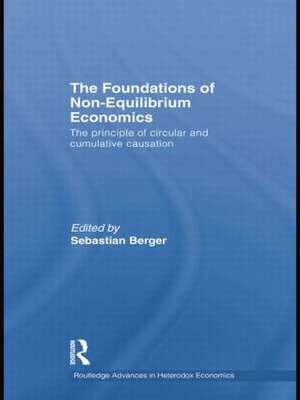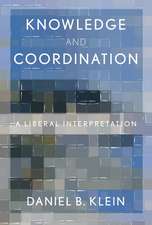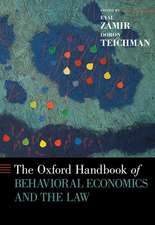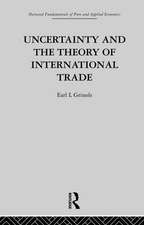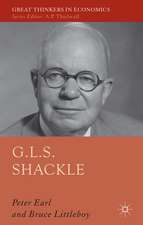The Foundations of Non-Equilibrium Economics: The principle of circular and cumulative causation: Routledge Advances in Heterodox Economics
Editat de Sebastian Bergeren Limba Engleză Paperback – 30 mai 2014
As the most comprehensive collection of the growing body of CCC research to date, this book also reflects the emergence of an economic paradigm for understanding economic dynamics and for crafting viable development strategies for the 21st century. The volume will be of great interest to scholars of growth and development economics, institutional and evolutionary economics, political economy, and Post Keynesian economics from undergraduate to postgraduate research levels.
| Toate formatele și edițiile | Preț | Express |
|---|---|---|
| Paperback (1) | 410.46 lei 6-8 săpt. | |
| Taylor & Francis – 30 mai 2014 | 410.46 lei 6-8 săpt. | |
| Hardback (1) | 1055.51 lei 6-8 săpt. | |
| Taylor & Francis – 6 iul 2009 | 1055.51 lei 6-8 săpt. |
Din seria Routledge Advances in Heterodox Economics
-
 Preț: 288.56 lei
Preț: 288.56 lei -
 Preț: 379.30 lei
Preț: 379.30 lei - 26%
 Preț: 848.96 lei
Preț: 848.96 lei - 18%
 Preț: 1058.69 lei
Preț: 1058.69 lei - 18%
 Preț: 1173.97 lei
Preț: 1173.97 lei - 18%
 Preț: 1057.13 lei
Preț: 1057.13 lei -
 Preț: 449.41 lei
Preț: 449.41 lei - 18%
 Preț: 1052.35 lei
Preț: 1052.35 lei - 25%
 Preț: 767.88 lei
Preț: 767.88 lei - 15%
 Preț: 267.20 lei
Preț: 267.20 lei - 18%
 Preț: 1171.54 lei
Preț: 1171.54 lei - 18%
 Preț: 1068.18 lei
Preț: 1068.18 lei -
 Preț: 482.62 lei
Preț: 482.62 lei - 18%
 Preț: 1062.79 lei
Preț: 1062.79 lei - 26%
 Preț: 765.01 lei
Preț: 765.01 lei - 15%
 Preț: 460.56 lei
Preț: 460.56 lei - 26%
 Preț: 762.57 lei
Preț: 762.57 lei -
 Preț: 484.47 lei
Preț: 484.47 lei - 12%
 Preț: 299.25 lei
Preț: 299.25 lei -
 Preț: 467.82 lei
Preț: 467.82 lei - 26%
 Preț: 847.31 lei
Preț: 847.31 lei - 15%
 Preț: 423.60 lei
Preț: 423.60 lei -
 Preț: 492.96 lei
Preț: 492.96 lei - 18%
 Preț: 1050.02 lei
Preț: 1050.02 lei - 12%
 Preț: 325.34 lei
Preț: 325.34 lei - 18%
 Preț: 1055.51 lei
Preț: 1055.51 lei - 25%
 Preț: 571.41 lei
Preț: 571.41 lei -
 Preț: 410.46 lei
Preț: 410.46 lei - 18%
 Preț: 1064.01 lei
Preț: 1064.01 lei - 26%
 Preț: 848.15 lei
Preț: 848.15 lei -
 Preț: 486.80 lei
Preț: 486.80 lei - 18%
 Preț: 699.96 lei
Preț: 699.96 lei - 18%
 Preț: 1061.06 lei
Preț: 1061.06 lei - 26%
 Preț: 821.53 lei
Preț: 821.53 lei - 18%
 Preț: 1055.32 lei
Preț: 1055.32 lei
Preț: 410.46 lei
Nou
Puncte Express: 616
Preț estimativ în valută:
78.54€ • 82.22$ • 64.99£
78.54€ • 82.22$ • 64.99£
Carte tipărită la comandă
Livrare economică 05-19 aprilie
Preluare comenzi: 021 569.72.76
Specificații
ISBN-13: 9781138802919
ISBN-10: 1138802913
Pagini: 224
Ilustrații: 16
Dimensiuni: 156 x 234 x 13 mm
Greutate: 0.32 kg
Ediția:1
Editura: Taylor & Francis
Colecția Routledge
Seria Routledge Advances in Heterodox Economics
Locul publicării:Oxford, United Kingdom
ISBN-10: 1138802913
Pagini: 224
Ilustrații: 16
Dimensiuni: 156 x 234 x 13 mm
Greutate: 0.32 kg
Ediția:1
Editura: Taylor & Francis
Colecția Routledge
Seria Routledge Advances in Heterodox Economics
Locul publicării:Oxford, United Kingdom
Public țintă
Postgraduate and UndergraduateCuprins
1. Introduction Sebastian Berger 2. On Competing Views of the Importance of Increasing Returns, Cumulative Causation and Path-Dependence John McCombie and Mark Roberts 3. Cumulative Causation in Northeast Asian Post-War Industry Policy Phillip Toner and Gavan Butler 4. Cumulative Causation and Industrial Development: The Regional Stage George Argyrous and Geoff Bamberry 5. Nicholas Kaldor and Cumulative Causation: Public Policy Implications Ric Holt and Steven Pressman 6. The Principle of Circular and Cumulative Causation: Myrdal, Kaldor and Contemporary Heterodox Political Economy Phillip Anthony O’Hara 7. Circular Cumulative Causation à la Myrdal and Kapp Sebastian Berger 8. Utilizing the Social Fabric Matrix to Articulate Circular and Cumulative Causation for Conceptual Conclusions F. Gregory Hayden 9. Unnatural Depletion and Artificial Abundance: A Circular Cumulative Causation Analysis of Salmon Fisheries and Some Implications for Political Ecological Economics Sebastian Berger and James Edward Glavin IV 10. Circular and Cumulative Causation in the Classics: Anticipations, Family Resemblances, and the Influence of Post-Keynesian Economics Mathew Forstater and Michael Murray 11. Continuity, Continuousness: The Chain of Ideas Linking Peirce’s Synechism to Veblen’s Cumulative Causation John Hall and Oliver Whybrow 12. Cumulative Causation and the Origin of Money Alla Semenova
Notă biografică
Sebastian Berger is an assistant professor at Roanoke College and was awarded the 2008 Helen Potter Award for the best paper in the Review of Social Economy.
Recenzii
'The theory of circular cumulative causation (CCC) is imbued with a long and distinguished intellectual legacy in the history of economic thought. Its intellectual roots can be traced back to Adam Smith, Veblen, Myrdal and Kaldor. CCC represents a rigorous alternative paradigm in the study of the dynamics of growth and technological change. Quite contrary to prevailing neoclassical theories based upon mechanistic notions of equilibrium, CCC offers a powerful critique and develops a sophisticated theory of non-equilibrium dynamics. At present, the research in this exciting new school is still in its infancy and comprises an eclectic mixture of diverse approaches and methodologies. This volume represents an important contribution to this growing literature and should become an invaluable source to academics and practitioners alike.' - Bill Lucarelli, University of Western Sydney, Australia
'Set out to bring different traditions of [circular cumulative causation] CCC theorists together and to revitalize the nonequilibrium approach to economic research and teaching, The Foundations of Non-Equilibrium Economics has at least succeeded in providing the scientific community with a comprehensive review of the state of the art of using CCC as a very powerful tool of economic analysis.' - Torsten Heinrich, Heterodox Economics Newsletter
'This edited collection of articles explores the theoretical basis and links of CCC within the traditions of institutional and post-Keynesian economics.' - Journal of Australian Political Economy
'...these ideas of circular and cumulative causation can create a platform to bring together the whole range of heterodox economic approaches, creating enough common ground on how the economy - and indeed society - actually functions, so that these various schools of thought can engage in dialgoue and joint research.' - Jonathan Michie, International Review of Applied Economics
'Set out to bring different traditions of [circular cumulative causation] CCC theorists together and to revitalize the nonequilibrium approach to economic research and teaching, The Foundations of Non-Equilibrium Economics has at least succeeded in providing the scientific community with a comprehensive review of the state of the art of using CCC as a very powerful tool of economic analysis.' - Torsten Heinrich, Heterodox Economics Newsletter
'This edited collection of articles explores the theoretical basis and links of CCC within the traditions of institutional and post-Keynesian economics.' - Journal of Australian Political Economy
'...these ideas of circular and cumulative causation can create a platform to bring together the whole range of heterodox economic approaches, creating enough common ground on how the economy - and indeed society - actually functions, so that these various schools of thought can engage in dialgoue and joint research.' - Jonathan Michie, International Review of Applied Economics
Descriere
This thought-provoking volume seeks to answer some of the ultimate economic questions in terms of a theory that emerged with Adam Smith and is now come to full fruition; the principle of circular and cumulative causation (CCC) This full-fledged theoretical framework explains the whole interplay of technology, firms, resources, culture, institutions and economic policy to understand the basic drives behind modern day economic dynamics.
